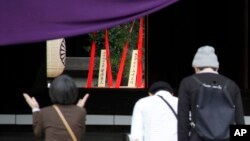Japanese Prime Minister Shinzo Abe has made a ritual offering to a controversial shrine honoring the country’s war dead, sparking a sharp response from both China and South Korea. The offering has raised tensions ahead of Abe’s expected meeting with Chinese President Xi Jinping on the sidelines of an international summit in Jakarta.
The Yasukuni shrine has long been a thorn in the side of Japan’s relations with China and its other Asian neighbors. The shrine for Japan’s war dead includes those convicted as war criminals in the wake of World War II.
Personal visits in the past have sparked outrage from Japan’s neighbors, but the decision by Abe to stave off a visit and instead send a potted tree as a religious gift was still seen as an irritation.
South Korean Foreign Ministry spokesman Noh Kwang-il said “Japanese political leaders should clearly understand that paying their appreciation and respect towards the Yasukuni shrine is perceived as violating international agreements and harming international stability.”
China’s Foreign Ministry spokesman Hong Lei said China’s position on the shrine is consistent and clear.
Hong said Abe “must earnestly abide by the relevant promises of past cabinets to face up to and reflect on the (Japan’s) history of aggression.” Hong Lei urged him to “take real steps to win the trust of its Asian neighbors and the international community."
As the world marks the 70th anniversary of World War II this year, Japan is coming under increasing pressure to acknowledge its past aggressions. Abe had been expected to meet with his Chinese counterpart Xi Jinping on the sidelines of this weeks Asia Africa summit in Indonesia.
Speaking with reporters before departing, Abe said that he is “ready to meet with (Xi) if such occasion naturally arises.” He also said he “would like to improve ties with China further based on the principle of a mutually beneficial, strategic relationship.”
How much of an impact the offering might have on the proposed meeting is unclear. China’s foreign ministry says President Xi’s schedule at the summit is not yet set and Japanese media have argued that what Prime Minister Abe says in an anticipated speech at the event could be key.
A Japanese government source told Reuters that Abe will express his remorse over World War II during the speech, but there are questions about just how far he may go.
